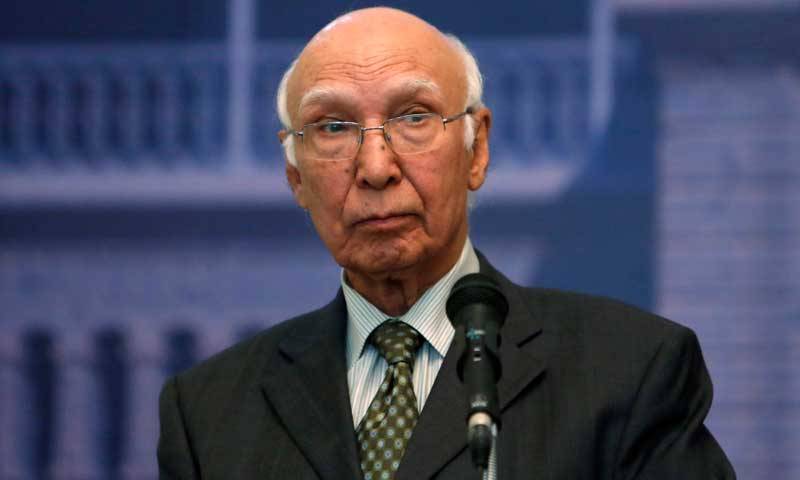ISLAMABAD - Pakistan is considering to move a resolution in the next session of the UN General Assembly in September 2016 to declare the Indian Ocean a "nuclear-free zone" while keeping in view India's dangerous plans to nuclearise the ocean.
Adviser to Prime Minister on Foreign Affairs Sartaj Aziz said this while giving a policy statement in the Senate on India's recent test of interceptor missile. His policy statement came on the call of Chairman Senate Mian Raza Rabbani who the other day had said that the house had serious concerns over the threats the country's national security is facing in the wake of India's recent test of supersonic interceptor missile. "India is pursuing massive conventional nuclear and missile development programmes, which are now leading to nuclearisation of Indian Ocean," said Sartaj Aziz and added: "We will have to upgrade our defensive capabilities through suitable technologies without entering into an arms race."
He said that Pakistan was also planning to highlight the dangerous implications of India's plans to nuclearise the Indian Ocean in all relevant international fora. "We will approach all the 32 littoral states that straddle the Indian Ocean to co-sponsor this resolution. We are also taking up this issue with all the major powers bilaterally and through multilateral fora," he added.
India has conducted an interceptor missile test of its advanced Air Defence Missile (ADM) Ashwin on May 15. Apart from this air defence system, India has also recently conducted tests of nuclear capable submarine based K4 Ballistic Missiles.
The adviser said India was building large nuclear powered submarines to carry these nuclear armed missiles as a part of its second strike nuclear capability and showed serious concerns over these developments. "We will take all necessary measures to augment its defence capabilities," he added.
He said that the deployment of these nuclear powered and nuclear armed missiles in the Indian Ocean will not only upset the strategic balance in South Asia but will also affect the maritime security of all the 32 littoral states around the Indian Ocean. "The nuclear and advanced conventional weapon technologies require considerable responsibility and maturity, which these Indian actions do not seem to reflect," he said.
He said that the development of Anti-Ballistic Missile system (ABMs) might give India a false sense of security, leading to unexpected complications. "Such actions are also contrary to the policy of a peaceful and friendly neighbourhood, which our Prime Minister has repeatedly espoused," he added. During the Composite Dialogue, Pakistan had offered discussions on an ABM Free Zone in South Asia as part of nuclear confidence building measures. However, India has not so far responded favourably, he said.
Chairman Raza Rabbani also remarked that the house had serious reservations over the statement of US State Department that it gives the operational policy of F-16 fighter jets. "Pakistan is a sovereign state and state of Pakistan has reservations over this statement and the Foreign Office should convey the reservations of the house to US," he said.
The house also adopted a unanimous resolution to forward recommendations finalised by the leader of the house and the opposition leader to government about Council of Common Interest (CCI). "The resolution urges the government to comply with the constitutional provisions concerning CCI especially regular holding of its meetings, establishing its permanent secretariat of CCI and timely submission of its reports to the Parliament," it says. It also asked the federal government to hold population census as soon as possible but well before the next general elections. "The house urges the government to include issues of construction of water reservoirs as well as progress on CPEC in the agenda of every meeting of CCI," he added. The resolution asked the federal government to devise a mechanism of accountability and all chief ministers should rigorously attend the meetings of CCI.






